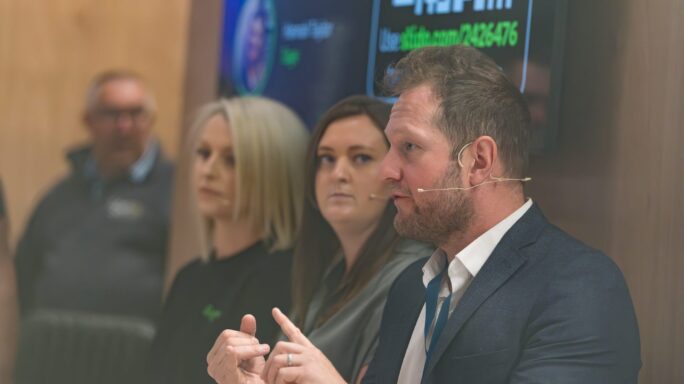How to get more referrals from banks than ever before
In a webinar for Sage I summarised the key findings from and implications of the largest research study ever into the referral relationships between accountants and bankers.With over 850 UK bankers and accountants taking part, the implications of the research are both robust and profound. In particular, by concentrating on the comparisons between the results […]

In a webinar for Sage I summarised the key findings from and implications of the largest research study ever into the referral relationships between accountants and bankers.With over 850 UK bankers and accountants taking part, the implications of the research are both robust and profound.
In particular, by concentrating on the comparisons between the results and behaviours of the firms that are successful with bank referrals, and those that aren’t, we were able to gain powerful new insights into what best bank referral practice looks like, and the return on investment accountants can expect from applying best practice.
Successful accountants get much better results
In terms of results, the successful accountants:
- Are significantly happier with their banking relationships – ie they give them an average score of 8.6 out of 10, compared to only 2.6
- Receive more referrals – ie only 16% of successful accountants receive no referrals from banks, compared to 40% of unsuccessful accountants – and 41% receive 11 or more referrals a year, whereas only 7% of unsuccessful firms receive that many
- Are more likely to regard banks as their best sources of referrals – ie 48% of successful accountants say they are, compared to only 14% of the others
- Convert a higher percentage of the referrals they receive into clients – ie 77% convert at least half of all the referrals they receive into clients, compared to only 50%
Because successful accountants do things differently
In terms of the differences in behaviour that appear to help explain their much better results, the successful accountants:
- Refer to a higher number of bankers – ie an average of 3.1 bankers, compared to only 2.0 with the unsuccessful accountants
- Make more total referrals to their banking contacts – ie a median of 6-10 referrals a year, compared to 1-5 for the unsuccessful firms
- Place more emphasis on their relationships with bankers – for example, 78% say building strong offline relationships is one of the keys to receiving more and better referrals, compared to 64%
- Are more likely to choose their referral partners on the basis that they refer work to the accountant – ie 46% of successful accountants cite this as the main reason for choosing a banker to refer to, compared to only 24% of the unsuccessful accountants
- Ask for referrals more often – ie 78% ask at least twice a year and 54% ask at least four times a year, compared to only 39% and 16% respectively of unsuccessful accountants
- Use a larger number of different referral systems – ie 54% use at least 3 different referral systems, compared to only 39%
- Are more likely to give case studies and testimonials to make it easier for bankers to refer people to them – ie 43% of them do this, compared to 35%
- For the same reason they are also:
– Slightly more likely to give their banking contacts an ideal client profile – ie 50% of them do this, compared to 42%
– More likely to give bankers a list of their target clients – ie 22% do this, compared to 13%
– And more likely to offer freebies so that the banker’s contacts can feel the quality before making a decision to appoint – ie 17% do this compared to 11% - Are somewhat less likely to just say “thank you” for a referral – ie 67% of them do this, compared to 79% of unsuccessful accountants.
- Instead they are slightly more likely to say thank you by giving the banker a referral back (54% compared to 48%), giving them some form of a gift (26% compared to 21%) or inviting the banker to a social or sporting event (24% compared to 20%)
What this means for you
Some accountants are very successful in generating referrals from bankers. In contrast, the research shows very clearly that many other accountants appear to be uninterested in and even disillusioned with their relationships with the banking community.Clearly there are no legal requirements for accountants to be more involved and effective in this area. But, equally clearly, there can be very substantial commercial benefits to you and your clients if you build better referral relationships with bankers. These benefits include:
- Winning more of the right kind of clients – with some accountants getting more than 30 referrals a year and converting over 70% of them into clients
- Increasing profits and capital value – as a result of winning all those new clients
- Serving clients in the best possible way – since by working with the right bankers, accountants can ensure that their clients get the funding, facilities and support necessary to meet the needs of the businesses whatever the economy throws at them. In turn this yields the further benefit of…
- Keeping clients in business – which as well as being really good news for the clients in question, is also really good news for the recurring income and reputation of the practice
- Easier and cheaper sales and marketing – since less time, effort and money is needed to generate leads and turn them into clients and customers
- Less price resistance and better cross-selling opportunities – due to them being recommended by a trusted source
- Higher lifetime value of the clients and customers won
For those seven key reasons I urge you to take the findings of the research very seriously indeed.





